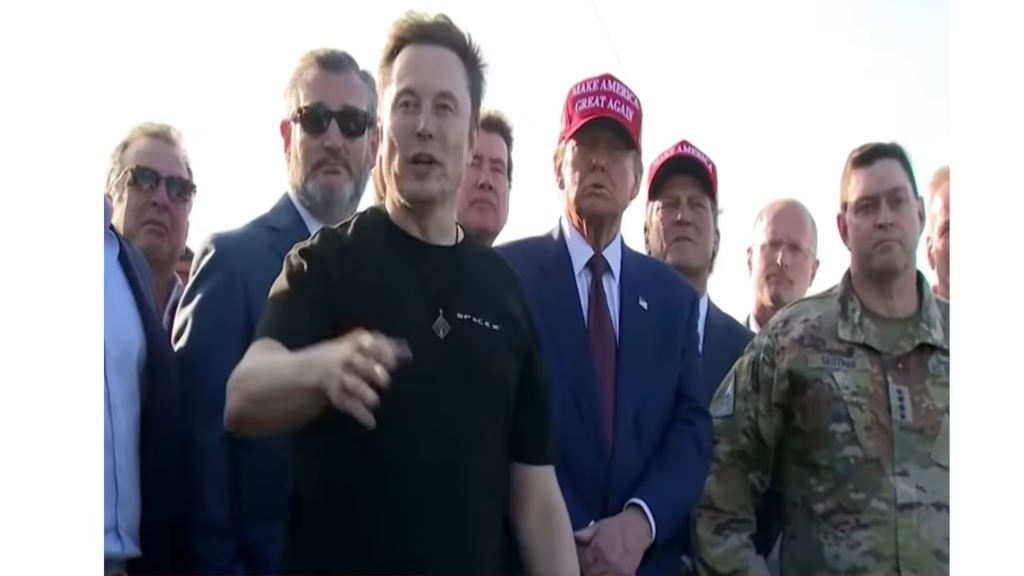
Elon Musk, the world’s richest man and a figure synonymous with groundbreaking technological innovation, has reportedly been denied the highest level of security clearance needed to access sensitive government secrets. According to a report by the Wall Street Journal, Musk’s inability to obtain such clearance stems from a combination of factors, including alleged drug use and his international connections. Despite his pivotal role in leading SpaceX a company deeply intertwined with U.S. military and intelligence programs Musk remains excluded from the inner circle privy to the most classified government projects.
SpaceX and National Security
SpaceX, founded by Musk, has been a cornerstone in the United States’ push for private-sector involvement in space exploration and defense. The company’s launches often carry payloads for U.S. military and spy agencies, which are treated as top government secrets. These missions involve classified information, accessible only to a select group of SpaceX employees who hold the highest levels of security clearance. Notably, Musk himself is not among those individuals.
Why Musk Lacks the Clearance
The Wall Street Journal suggests that Musk’s inability to secure the highest level of security clearance is largely due to his past behavior and associations. For one, Musk has been under scrutiny for his interactions with foreign nationals. In a striking revelation, the report mentions that Musk has allegedly been in secret contact with Russian President Vladimir Putin since 2022. Such interactions raise red flags in the context of national security, particularly when dealing with sensitive government projects.
Another significant factor is Musk’s history of drug use. In 2018, during an infamous podcast interview with Joe Rogan, Musk publicly smoked marijuana. While marijuana use is legal in some states, it remains illegal under federal law, and such incidents can complicate security clearance processes. Additionally, recent reports have alleged that Musk uses other illegal substances, including LSD, cocaine, ecstasy, ketamine, and psychedelic mushrooms. These allegations further hinder his ability to qualify for the top-tier clearance required to access SpaceX’s classified operations, such as its spy satellite program, Starshield.
Current Security Clearance Status
Despite these setbacks, Musk does hold the second-highest level of government clearance, which he obtained in 2022. This clearance grants him access to some classified information but stops short of allowing him to delve into the most sensitive projects under SpaceX’s purview. For instance, Musk is reportedly barred from entering certain SpaceX facilities where classified work is conducted and discussed. This restriction underscores the strict barriers in place to prevent individuals without the necessary clearance from accessing critical national security information.
Musk’s Perspective on Secrecy
Interestingly, Musk himself has expressed skepticism about the necessity of such stringent secrecy. He has previously stated that much of the classified information is “so boring” that it’s kept secret more out of habit than necessity. However, he acknowledges the importance of safeguarding genuinely sensitive information, such as instructions for creating nuclear weapons. Musk’s casual attitude toward classified information may also contribute to the hesitance in granting him the highest level of security clearance.
Legal and Political Implications
The legal complexities surrounding Musk’s clearance are compounded by SpaceX’s critical role in national defense. The company’s lawyers reportedly worry that applying for the highest level of clearance for Musk could backfire. If his application were denied, it could result in the revocation of his current clearance, further isolating him from the company’s most classified projects. This precarious situation places both Musk and SpaceX in a delicate position, balancing the billionaire’s leadership role with the company’s obligations to national security.
Trump’s Potential Influence
The report also speculates on how a potential return of Donald Trump to the presidency could change Musk’s situation. As president, Trump would have the authority to control the flow of national security information. Given Musk’s close relationship with Trump and his potential appointment as an adviser on federal spending, Trump could theoretically bypass traditional clearance processes to grant Musk access to classified information. Such a move would undoubtedly raise ethical and legal questions, but it highlights the unpredictable nature of the interplay between politics and national security.
Musk’s Global Ambitions
Musk’s international ventures and relationships further complicate his standing. For instance, Russian officials have praised Musk as a “talented businessman” and expressed interest in collaborating with him on private space initiatives. While these endorsements underscore Musk’s global influence, they also raise concerns about his connections with foreign entities, particularly adversaries of the United States. This global footprint, while beneficial for Musk’s business empire, adds another layer of complexity to his security clearance eligibility.
Broader Implications for SpaceX
Musk’s exclusion from top-secret programs raises broader questions about SpaceX’s governance and its relationship with the U.S. government. As a private company, SpaceX has revolutionized space exploration and transportation, earning contracts with NASA and the Department of Defense. However, its reliance on classified government projects means that the company must navigate stringent security protocols, often independent of its founder’s direct involvement. This dynamic highlights the unique challenges faced by private companies operating in the national security sphere.
Conclusion
Elon Musk’s inability to access SpaceX’s top government secrets underscores the intricate balance between innovation, security, and accountability. While Musk’s visionary leadership has propelled SpaceX to the forefront of space exploration, his personal behavior and associations have created significant barriers to his inclusion in the most sensitive aspects of the company’s operations. As SpaceX continues to play a critical role in national defense, the implications of Musk’s exclusion will likely remain a point of contention in the intersection of private enterprise and government oversight. Whether political shifts or changes in Musk’s conduct will alter this dynamic remains to be seen, but for now, the world’s richest man finds himself on the outside looking in when it comes to the nation’s most closely guarded secrets.